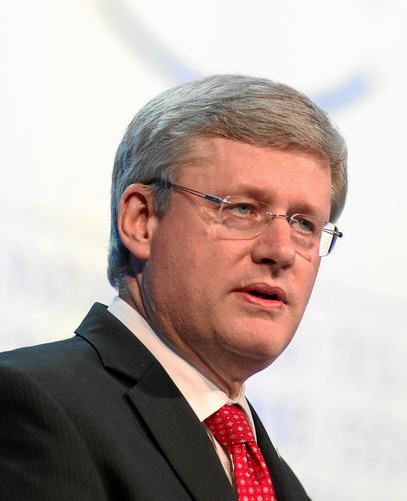
Michael Geist reports that PM Stephen Harper has resolved a dispute between Industry Minister, Tony Clement, and Heritage Minister, James Moore, by siding with Moore and opting for DMCA-style copyright legislation. This would bring us more in line with American policy notwithstanding the fact that copyright consultations last summer suggested that popular opinion favoured something less stringent.
Further bolstering his reputation for a dictatorial management style, Harper has chosen to ignore his constituency, perhaps hoping that copyright law will strike the average voter as sufficiently abstract or arcane that nobody will really care that it’s of a piece with the rest of his ideological package: there is no such thing as culture; only products to be blister-wrapped and sold in the marketplace; local Canadian cultures only matter to the extent that we can sell them; indigenous voices don”t count; the CBC is pointless; heritage is a joke; history — or any story — doesn’t matter.
I am sufficiently pissed off that I’ve written a letter to my MP, but he”s a liberal, so I’ve made a point of cc’ing it to Stephen Harper and James Moore. Feel free to use any or all of it as you see fit.
May 5, 2010
_, M.P.
House of Commons
Ottawa, Ontario K1A 0A6
Dear Sir/Madam:
Re: Proposed Copyright Legislation
I have learned that within the next six weeks the Conservative government intends to table new copyright legislation that will revisit Bill C-61 and will, in many respects, resemble the U.S. Digital Millennium Copyright Act enacted during the Clinton administration. While it is reasonable to suppose that new media require new legislation, nevertheless the American experience has demonstrated that more stringent regulation serves the interests of no one save a handful of media conglomerates. The following are concerns which I hope you will bear in mind:
1. Those who participated in the copyright consultations which the Conservative government sponsored from July to September of last year were led to believe that the government might actually note the content of their submissions, the majority of which leaned markedly away from the current proposal.
2. In February, the Computer and Communications Industry Association, whose membership includes media giants like Microsoft, Google, T-Mobile, Fujitsu, AMD, eBay, Intuit, Oracle and Yahoo, stated in its submissions to the USTR: “Canada’s current copyright law and practice clearly satisfy the statutory adequate and effective standard. Indeed, in a number respects, Canada’s laws are more protective of creators than those of the United States.”
3. Inflexible fair use provisions will introduce a chilling effect into the creative process. “Borrowing” is fundamental to both the creative process and the transmission of culture. I think of P.K. Page’s volume of poetry, Coal and Roses, nominated for this year’s Griffin Poetry Prize. Each poem borrows from what has gone before, not to steal, but to launch something fresh and original. Under the proposed legislation, such an exemplar of Canadian culture might never see the light of day. The administrative resources required to vet what is, under the current regime, a series of fair use quotations, coupled with fear of expensive litigation, would make it unlikely that such a work would ever find a publisher. Merit would be irrelevant.
4. The American experience with DRM has proven ineffectual and it has interfered with the proprietary interests of legitimate consumers. While concerns about piracy are understandable, they should not be invoked to rationalize provisions which entrench the interests of media behemoths.
5. The quasi-criminalization of copyright legislation and the removal of judicial discretion in the determination of penalties has led to absurd results in the U.S., has produced an unnecessarily antagonistic relationship between consumers and corporate copyright holders, and has often brought the whole legislative regime into disrepute. Canada would best be served by avoiding such nonsense.
I urge you to oppose any such legislation should it come before the House of Commons.
Yours sincerely,
etc.
cc. The Right Honourable Stephen Harper, P.C., M.P. Prime Minister of Canada
The Honourable James Moore, P.C., M.P. Minister of Canadian Heritage and Official Languages
Photo Credit: World Economic Forum [CC BY 2.0 (https://creativecommons.org/licenses/by/2.0)]